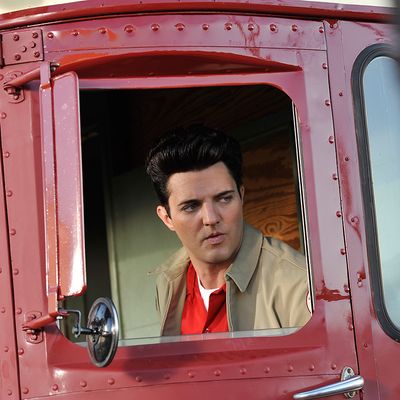
Did I actually see The Identical, or did I dream it? Despite its competent, polished surfaces, this is a deceptively strange movie: a faith-inflected mock-rock biopic about an Elvis-like phenomenon and his long-lost twin that turns into something of a religious allegory. ItÔÇÖs stocked with clich├®s, but theyÔÇÖre arranged in such weird ways that the end result is both predictable and certifiable. If only any of it actually went somewhere.
The story begins in the middle of the Depression, with a young, poor couple giving birth to twin boys. Unable to provide for the kids, Dad has the nutty but selfless idea of letting one child go away with a traveling preacher (Ray Liotta), who (awkwardly) reveals during one of his fire-ÔÇÖnÔÇÖ-brimstone sermons that he and his wife (Ashley Judd) canÔÇÖt conceive. And so, Dexter Hemsley (renamed Ray Wade) and his brother Drexel grow up unaware of each other, with the birth parents pretending Dexter died at birth. (The story is clearly inspired in part by the story of Elvis PresleyÔÇÖs own stillborn twin, Jesse Garon Presley.)
The film largely follows Ray (played as a teen and adult by Elvis look-alike Blake Rayne) as he grows to become obsessed with rock and roll, much to his preacher dads dismay. But Ray also has a low, beautiful (Elvis-like) voice and wild (Elvis-like) moves, and he seemingly cant be contained  except that his brother gets there first. Thus, Ray finds that his voice and his presence are the exact replica of national pop phenomenon Drexel The Dream Hemsley, and he has to content himself with being an imitator doing local carnivals and contests and corn fests as The Identical. It doesnt seem to raise too many questions that Ray looks exactly like Drexel, a total stranger, but thats the added luster of fame, I suppose: It has a magical way of transforming people into gods.
There are other germs of ideas here: the existential dilemma of living in anotherÔÇÖs shadow; the conflict between wanting to branch out on your own and needing to stick to anotherÔÇÖs script; the unspoken bond between two identical, unknown twins drawing each (sometimes subtly) into the otherÔÇÖs orbit. ItÔÇÖs not so much that The Identical doesnÔÇÖt do anything with these ideas; itÔÇÖs that it doesnÔÇÖt seem to know what to do with them. The film is being billed by some as a ÔÇ£faith-basedÔÇØ release ÔÇö another in a long line of mainstream religious alternatives weÔÇÖve gotten this year, from the curiously touching Heaven Is for Real to the curiously awful GodÔÇÖs Not Dead. But if thereÔÇÖs a message here ÔÇö spiritual or otherwise ÔÇö itÔÇÖs hopelessly muddled. Ray eventually takes on vaguely Jesus-like overtones, but is he merely imitating Drexel? Is he living in the shadow of a Jesus-like ideal? What about the fact that Drexel himself confesses to feeling Ray/DexterÔÇÖs presence at one point? Does God even like rock and roll?
And whatÔÇÖs all this business about Israel? At one point, LiottaÔÇÖs preacher gives a furious, screaming sermon about the importance of protecting the Jewish state, at the height of the Six-Day War in 1967; later, we find out that Drexel and Dexter were both Jewish on their biological momÔÇÖs side. Are Jews the twins of Christians? Are the U.S. and Israel meant to be twins, separated at birth? This is slippery territory to get into, since if weÔÇÖre going to be talking about Israel and twins and separation, thereÔÇÖs also the inconvenient example of IsraelÔÇÖs own much-neglected and bombed-out twin, Palestine ÔÇö which IÔÇÖm sure is not the twin these filmmakers had in mind.
Ultimately, though, the problem with The Identical isnÔÇÖt so much that it mixes up messages but that it doesnÔÇÖt seem to understand what makes its premise interesting. Story threads ÔÇö about RayÔÇÖs attempts to start singing his own music, about the almost-supernatural draw rock and roll has on him, about his attempts to move out from under the shadow of his preacher father ÔÇö are briefly addressed, then abandoned. What weÔÇÖre left with, ultimately, are fragments of the movie this could have been, mixed together with uncertain messages that we probably didnÔÇÖt need. ItÔÇÖs a hot, holy mess.


